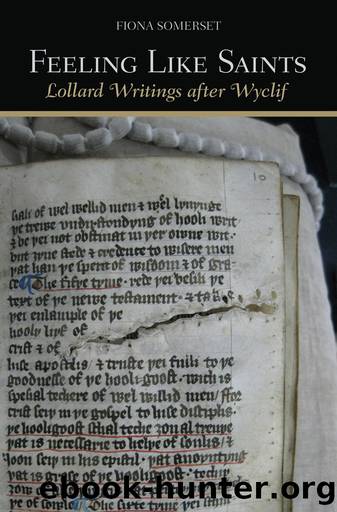Feeling Like Saints by Fiona Somerset

Author:Fiona Somerset [Somerset, Fiona]
Language: eng
Format: epub
Tags: Literary Criticism, Medieval, Religion, Christianity, History, Europe, Ancient & Classical
ISBN: 9780801470981
Google: xrxfAwAAQBAJ
Publisher: Cornell University Press
Published: 2014-05-08T22:25:45+00:00
CHAPTER 5
Lollard Parabiblia
The governing intention of the Wycliffite bible translation project has often been asserted or assumed. Lollards translated the entire text of the bible, Hebrew Bible and New Testament, into English because they wanted laymen and laywomen to be able to read all of its very own words for themselves, rather than having to rely on adulterated versions, interlarded with glosses and exempla that distort its message, as for example in sermons and pastoralia. The problem with this conventional wisdom is not that it is entirely wrong. After all, one lollard translator makes something like this claim: the final chapter of what is known as the General Prologue to the Wycliffite Bible is concerned throughout to establish that the translators have created a âtrewe and hool [complete] translaciounâ that will allow for better lay understanding of the bible, and similar concerns with lay access to the biblical text may be found elsewhere in lollard writings, especially in the short works collected in CUL Ii.6.26.1 Rather, the problem is that this conventional wisdom cannot on its own account for what the manuscript record shows us about how the bible was used, nor even for what the General Prologue itself explains, and demonstrates, about its purposes.
To begin with the manuscript record, few of the 250-odd extant copies of the whole of the Wycliffite Bible contain the full text of Old and New Testaments.2 Plainly, comprehensiveness was prized by the translators of the bible, for otherwise why would they have completed the whole. But not all book producers, not all readers, wanted the whole text. Probably there are a number of reasons why: expense is certainly one of them, and another may be that the bible was rapidly disseminated to book producers and readers who may have had very different agendas than the bibleâs translators. Yet we should be wary of explaining away every aspect of the bibleâs reception that does not meet our expectations as a corruption or dilution of the translatorsâ original intent; it may be that our expectations are what need adjusting. For it seems clear enough that the audiences who used partial texts included lollards: many biblical texts mentioned in heresy trials were partial copies.3 Nonetheless, manuscripts containing selections or excerpts from the Wycliffite Bible have received comparatively little attention in comparison with manuscripts of the whole bible, or at the very least the whole Old or New Testament, as if the evidence they provided about readership were less significant.
Scholars have also been reluctant to pay attention to some of the items that may accompany the text of the Wycliffite Bible in its manuscripts. The polemical prologues have had plenty of attention, and Mary Dove has done extensive work on explanatory glosses provided by the translators, while Matti Peikola has looked closely at the mise en page of a large sample of the manuscripts and at the developing forms of lectionary (that is, schedules of reading across the liturgical year) provided in these early, substantially complete copies of the Old or New Testament or both together.
Download
This site does not store any files on its server. We only index and link to content provided by other sites. Please contact the content providers to delete copyright contents if any and email us, we'll remove relevant links or contents immediately.
| Ancient & Classical | Arthurian Romance |
| Beat Generation | Feminist |
| Gothic & Romantic | LGBT |
| Medieval | Modern |
| Modernism | Postmodernism |
| Renaissance | Shakespeare |
| Surrealism | Victorian |
4 3 2 1: A Novel by Paul Auster(12363)
The handmaid's tale by Margaret Atwood(7750)
Giovanni's Room by James Baldwin(7316)
Asking the Right Questions: A Guide to Critical Thinking by M. Neil Browne & Stuart M. Keeley(5751)
Big Magic: Creative Living Beyond Fear by Elizabeth Gilbert(5748)
Ego Is the Enemy by Ryan Holiday(5411)
The Body: A Guide for Occupants by Bill Bryson(5075)
On Writing A Memoir of the Craft by Stephen King(4925)
Ken Follett - World without end by Ken Follett(4719)
Adulting by Kelly Williams Brown(4564)
Bluets by Maggie Nelson(4542)
Eat That Frog! by Brian Tracy(4514)
Guilty Pleasures by Laurell K Hamilton(4437)
The Poetry of Pablo Neruda by Pablo Neruda(4089)
Alive: The Story of the Andes Survivors by Piers Paul Read(4017)
White Noise - A Novel by Don DeLillo(3999)
Fingerprints of the Gods by Graham Hancock(3985)
The Book of Joy by Dalai Lama(3968)
The Bookshop by Penelope Fitzgerald(3843)
